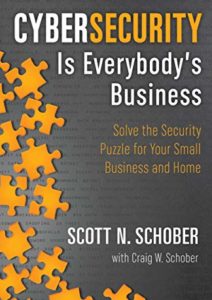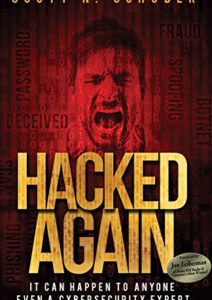How do you cyber secure your small business? In this Expert Insight Interview, Scott Schober discusses how to keep a small business safe from cyber-crime. Scott Schober is a CEO of a wireless threat detection company, cybersecurity and wireless technology expert, speaker, and the author.
The interview discusses:
Multi-factor authentication
Basic prevention measures
Social engineering
The newest threats
Multi-factor Authentication
When the pandemic started, people rushed to adapt their businesses for remote work. However, when many people work remotely, they sometimes use personal devices to access the company’s computer network. Thus, the security game has to level up, and the best solution is multi-factor authentication. People usually avoid multi-factor authentication because it takes one extra step to do it, but it offers an extra layer of security. Many cyber breaches happened in recent years because people accessed a company’s computer network from an unsecured third party.
Basic Prevention Measures
A small business can do some basic things to protect its sensitive data. For example, shredding documents with a micro cross-cut shredder guarantees the total destruction of that document. Another thing is protecting your passwords by using a hybrid model. Write down in a notebook the most significant passwords and store that notebook in a safe. For other passwords, you can use an open source password manager like Psono. You can store your passwords and credentials with an open-source password manager without having to worry about hacker access. And lastly, think about the free email accounts that you are using. Since there is no such thing as free lunch, you should be aware of a trade.
Social Engineering
Social engineering is when people get tricked into giving confidential information in a spare of the moment. Hackers usually call a business office and ask for a wifi password in order to send an email to someone from the office. They are convincing, quick-talking, and professionals in their manipulation. Once they get a wifi password, they can access and collect information from the whole computer network. Thus, it is essential for all employees, from a janitor to the CEO, to be educated, trained, and aware of protecting confidential information.
Newer Threats
During the pandemic, healthcare institutions became targets for a lot of cybercriminals. They attack hospitals or municipalities and ask for high ransom – up to the millions of dollars in bitcoin equivalency. However, the public does not hear a lot about this because insurance companies step in right away. In case a cyber attack happens, professionals will take a look to see if they already have a description key from a previous hack to unlock the system. If they do not have it, they will negotiate a smaller amount to give to hackers since they have bitcoins already stored for these purposes.
Our Host
John is the Amazon bestselling author of Winning the Battle for Sales: Lessons on Closing Every Deal from the World’s Greatest Military Victories and Social Upheaval: How to Win at Social Selling. A globally acknowledged Sales & Marketing thought leader, speaker, and strategist, he has conducted over 1500 video interviews of thought leaders for Sales POP! online sales magazine & YouTube Channel and for audio podcast channels where Sales POP! is rated in the top 2% of most popular shows out of 3,320,580 podcasts globally, ranked by Listen Score. He is CSMO at Pipeliner CRM. In his spare time, John is an avid Martial Artist.










Comments